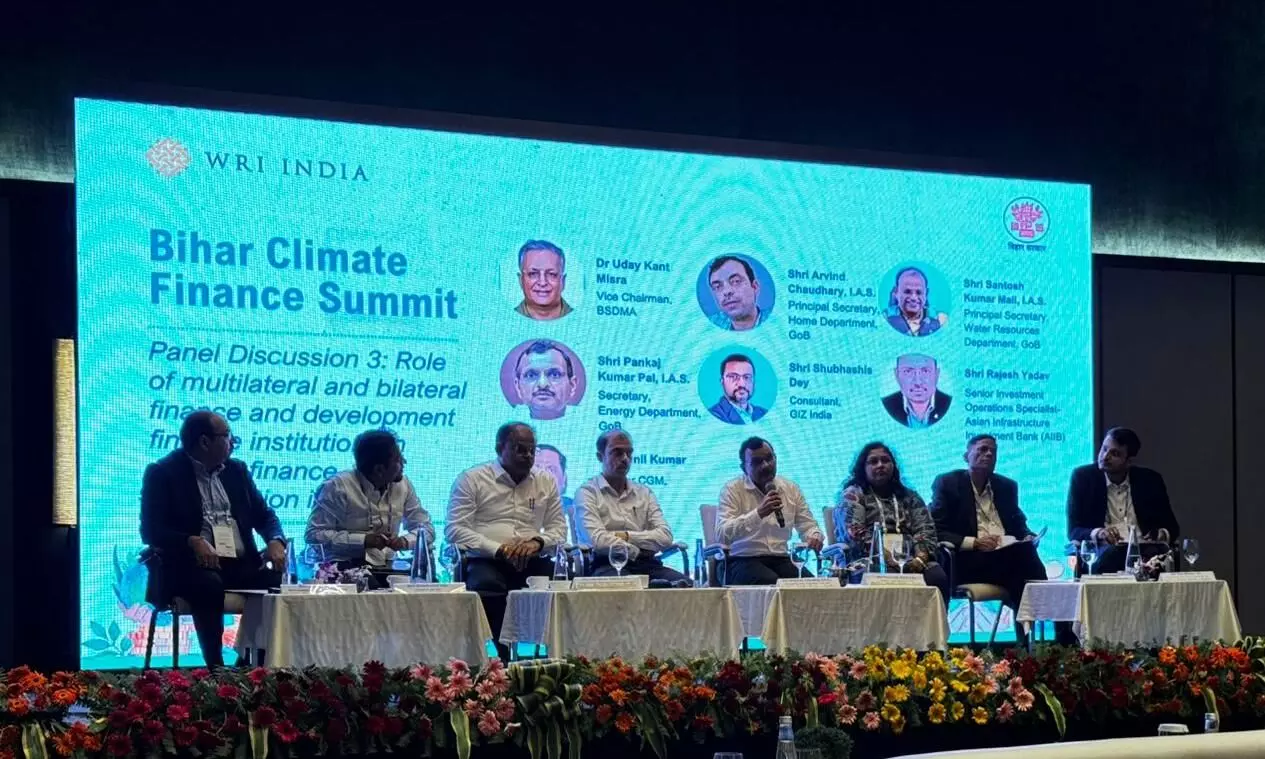Bihar Unveils Climate Finance and Sustainability Roadmap at Bihar Climate Finance Summit

Chief Minister Nitish Kumar-led Bihar government announced several initiatives to advance its climate finance and sustainability goals, including the formation of a climate finance cell under the finance department and finalising the state's renewable energy policy in November. The announcements were made during the Bihar Climate Finance Summit organised by the finance department in collaboration with WRI India on Monday.
In his address, Bihar Deputy Chief Minister and Finance Minister Samrat Choudhary highlighted the state government's commitment to securing climate finance. He said that in undivided Bihar, Jharkhand contributed 87% of the revenue while Bihar contributed only 13%, but the current government has made relentless efforts to ensure financial resources for economic and social development. We have increased our green cover from 10% to about 16%. He further said that other climate-related actions include promoting solar energy, waste management and electric vehicles.
In his address, Chief Minister's Principal Secretary Deepak Kumar said that the proposal to create a climate finance cell should be considered. Highlighting the government efforts, he cited the construction of rubber dam on the Falgu river in Gaya and the Ganga Jal Lift Yojana for cities like Rajgir, Gaya and Nawada. He called for curbing excessive groundwater extraction, and felling of trees for road widening and emphasized the inclusion of environmental studies in primary education.
Development Commissioner Pratyaya Amrit emphasized the importance of private sector participation in climate initiatives as a supplement to government efforts. He said that Bihar is one of the 25 states that have a new State Climate Change Action Plan. We have increased our green budget component from 7% to 10% and are implementing various initiatives under Jal Jeevan Hariyali and Bihar Vikas Mission initiatives.
Finance Department Principal Secretary Anand Kishore said that the proposal for the formation of the state's climate finance cell will soon be sent to the state government and it will be formed after the approval of the state government. In his address, he said, “After getting the approval of the state government, we will soon establish a climate finance cell under the Finance Department. Its main functions will include identifying green or climate-related projects, ensuring funding, assisting other departments in accessing climate finance, and monitoring and evaluating these green initiatives.”
Uday Kant Mishra, Vice-Chairman, Bihar State Disaster Management Authority (BSDMA), explained BSDMA’s collaborative work with the Indian Space Research Organisation (ISRO) on monitoring floods and flood protection measures. He mentioned BSDMA’s work with the Indian Institute of Science (IISc) on ‘digital twin’ technology to forecast urban flooding.
Addressing climate finance, Mihir Kumar Singh, Additional Chief Secretary, Panchayati Raj Department, discussed linking policies to funding. He suggested that the Bihar government may consider imposing a cess or similar fee on transactions related to natural resources or conservation efforts so that the proceeds can be used to fund green projects.
Santosh Kumar Mallal, Principal Secretary, Water Resources, highlighted the increasing frequency of climate-related disasters. He said that Nepal recently received over 400 mm of rain on September 27-28, an event that their flood management systems had successfully forecast. But efforts to prevent floods are imperative.
Transport Secretary Sanjay Kumar Agarwal stressed on separate budget allocation for green projects. In his statement, he said that instead of earmarking funds within the existing allocation, we can allocate a certain percentage specifically for green projects. The private sector also needs to be encouraged to contribute to climate finance.
Energy Department Secretary Pankaj Kumar Pal said that the new RE policy is expected to be launched in November. He further said that we have already connected about 33% of agricultural feeders to solar power.
Secretary of Urban Development and Housing Department Abhay Kumar Singh in his address discussed the need for coordination between the Finance and Urban Development departments to encourage urban green projects. He highlighted the waste-to-energy initiative in Patna, the sewage treatment plant along the Ganga and rainwater harvesting.
Ashima Jain, Secretary (Expenditure), Finance Department highlighted the challenges in attracting private climate finance. She said, “The public sector alone cannot meet the entire demand for climate finance. The private sector needs support in understanding public-private partnership frameworks, technical capacity building, and financial instruments such as green bonds and carbon credits.”
Commissioner, Patna Division Mayank Warwade highlighted the state’s commitment to reach net zero by 2070 and said that implementation of the strategy has begun at the ground level and progress is visible.
S Chandrashekhar, Chief Conservator of Forests and State Nodal Officer, Environment and Climate Change, emphasized increasing green cover in Bihar, which includes afforestation in notified forest areas and promoting agroforestry outside forest areas.
Ulka Kelkar, Executive Director, Climate, Economics and Finance (CEF), WRI India, emphasized the timeliness of the workshop in view of the upcoming COP 29 in Azerbaijan. She said that with climate finance being a central issue, this workshop provides a platform to share experiences and priorities for accessing and mobilizing climate finance in line with Bihar’s climate goals.
